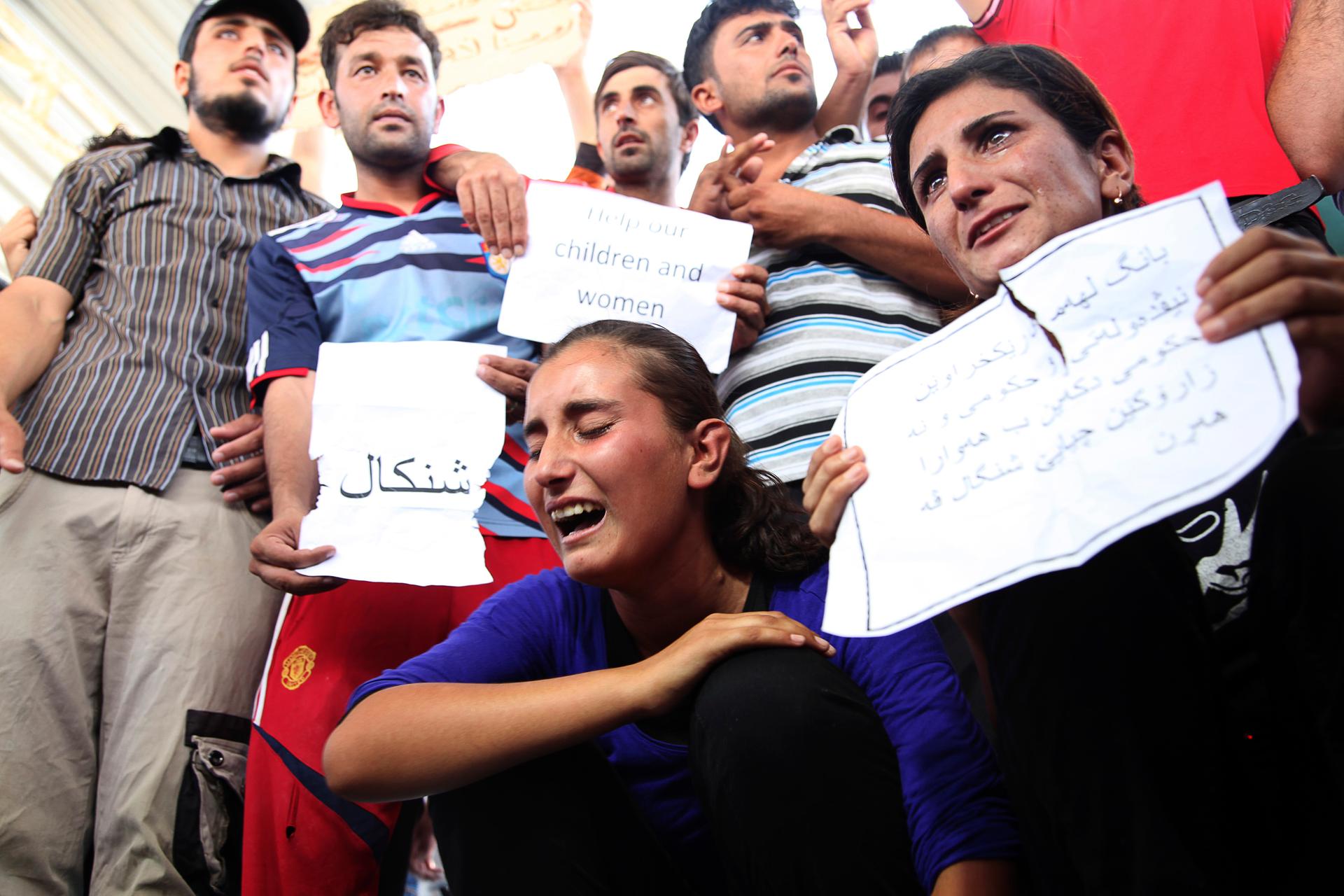Displaced demonstrators from the minority Yazidi sect gather during a protest against militants of ISIS in Irbil on August 4, 2014.
The US has launched at least two rounds of bombing runs on jihadis in northern Iraq. The extremists in question belong to ISIS, and they're going after anyone who doesn't pledge loyalty to them.
High on that list are members of the Yazidi sect, a religion centered in northern Iraq that blends traditions from Islam and pre-Islamic faiths. Islamists curse them as "devil worshippers," and ISIS has driven tens of thousands of Yazidis to take refuge on Mount Sinjar, where they hope to escape death. Secretary of State John Kerry says the ISIS attacks "show all the warning signs of genocide."
And they're not the only ones. Martin Smith of PBS' "Frontline" just returned from a trip to a camp for displaced people outside the ISIS-controlled city of Mosul. There he found Yazidis and members of other religious and ethnic groups — more than 5,000 people — looking for safety and squeezing into UN tents in sweltering heat. "The temperatures there were well over 110 degrees," he says. "Some complained about not having food."
Smith says people started coming here in early June. They're not wealthy enough to move into Irbil and they certainly can't head back to Mosul with ISIS in control. So, Smith says, they just sit around with nothing to do. And the only physical barrier between them and ISIS fighters is a trench dug around the camp for the purpose.
Even if Mosul is freed from ISIS, people in the camp worry they'll be seen as traitors by some ISIS supporters if they return. "They're really trapped," Smith says.
Smith says there is one important thing to understand about Mosul: the army didn't put up a fight. "There was no real fight for Mosul. The [Iraqi] army was a shadow of what it was reported to be. So when it came that ISIS was knocking on the door of the town, there was just no army to protect it."
That, he says, is why a force of about 800 guys were able to take control of the second largest city in the country.
The US has launched at least two rounds of bombing runs on jihadis in northern Iraq. The extremists in question belong to ISIS, and they're going after anyone who doesn't pledge loyalty to them.
High on that list are members of the Yazidi sect, a religion centered in northern Iraq that blends traditions from Islam and pre-Islamic faiths. Islamists curse them as "devil worshippers," and ISIS has driven tens of thousands of Yazidis to take refuge on Mount Sinjar, where they hope to escape death. Secretary of State John Kerry says the ISIS attacks "show all the warning signs of genocide."
And they're not the only ones. Martin Smith of PBS' "Frontline" just returned from a trip to a camp for displaced people outside the ISIS-controlled city of Mosul. There he found Yazidis and members of other religious and ethnic groups — more than 5,000 people — looking for safety and squeezing into UN tents in sweltering heat. "The temperatures there were well over 110 degrees," he says. "Some complained about not having food."
Smith says people started coming here in early June. They're not wealthy enough to move into Irbil and they certainly can't head back to Mosul with ISIS in control. So, Smith says, they just sit around with nothing to do. And the only physical barrier between them and ISIS fighters is a trench dug around the camp for the purpose.
Even if Mosul is freed from ISIS, people in the camp worry they'll be seen as traitors by some ISIS supporters if they return. "They're really trapped," Smith says.
Smith says there is one important thing to understand about Mosul: the army didn't put up a fight. "There was no real fight for Mosul. The [Iraqi] army was a shadow of what it was reported to be. So when it came that ISIS was knocking on the door of the town, there was just no army to protect it."
That, he says, is why a force of about 800 guys were able to take control of the second largest city in the country.
The article you just read is free because dedicated readers and listeners like you chose to support our nonprofit newsroom. Our team works tirelessly to ensure you hear the latest in international, human-centered reporting every weekday. But our work would not be possible without you. We need your help.
Make a gift today to help us reach our $25,000 goal and keep The World going strong. Every gift will get us one step closer.
